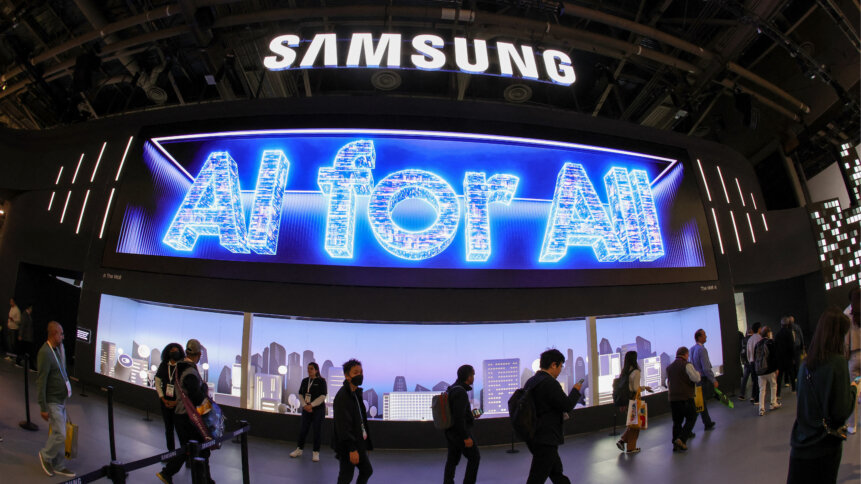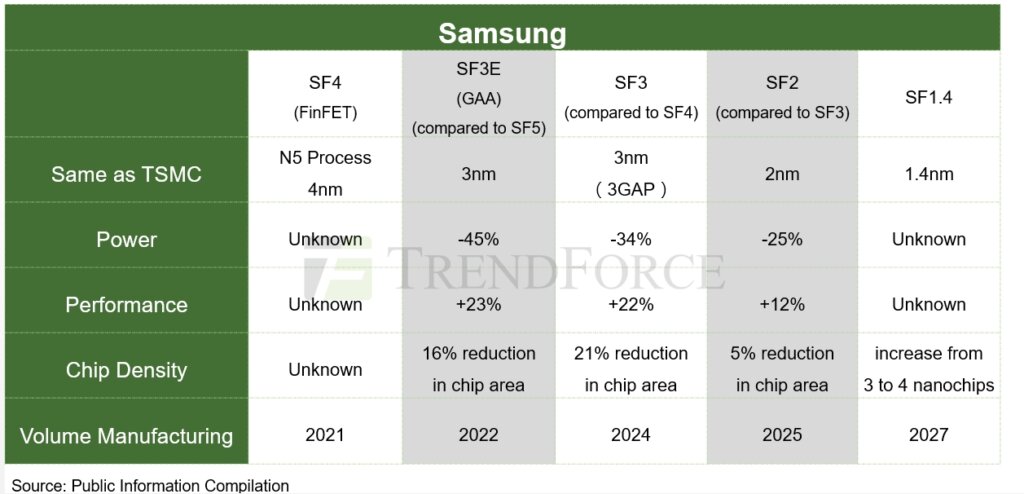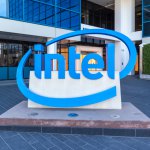Samsung seizes 2nm AI chip deal, challenging TSMC’s reign

- The inaugural deal for 2nm chips marks a significant milestone for Samsung, signaling a challenge to TSMC and its dominance.
- The deal could significantly change the power balance in the industry.
- Samsung has a strategy to offer lower prices for its 2nm process, reflecting its aggressive approach to attracting customers, particularly eyeing Qualcomm’s flagship chip orders.
In the race for technological supremacy and market dominance, Taiwan Semiconductor Manufacturing Company (TSMC) and Samsung Electronics lead the charge in semiconductor manufacturing. As demand for advanced chips surges in the 5G, AI, and IoT era, competition intensifies, driving innovation. Both companies vie to achieve smaller nanometer nodes, which are pivotal for technological advancement.
When it comes to semiconductor innovation, TSMC spearheads the charge, with ambitious plans for 3nm and 2nm chips, promising a leap in performance and efficiency. Meanwhile, Samsung, renowned for its memory chip prowess, is mounting a determined challenge to TSMC’s supremacy. Recent reports suggest that Samsung is on the brink of unveiling its 2nm chip technology, marking a significant milestone in its bid to rival TSMC.
In a notable turn of events disclosed during Samsung’s Q4 2023 financial report, the tech world buzzed with news of Samsung’s foundry division securing a prized contract for 2nm AI chips. Amid speculation, Samsung maintained secrecy about the identity of this crucial partner.
But earlier this week, a revelation from Business Korea unveiled that the patron happens to be Japanese AI startup Preferred Networks Inc. (PFN). Since its launch in 2014, PFN has emerged as a powerhouse in AI deep learning, drawing substantial investments from industry giants like Toyota, NTT, and FANUC, a leading Japanese robotics firm.
Samsung vs TSMC
Samsung, headquartered in Suwon, South Korea, is set to unleash its cutting-edge 2nm chip processing technology to craft AI accelerators and other advanced AI chips for PFN, as confirmed by industry insiders on February 16, 2024.
Should news of this landmark deal be legitimate, it would prove mutually advantageous. It would empower PFN with access to state-of-the-art chip innovations for a competitive edge while propelling Samsung forward in its fierce foundry market rivalry with TSMC, according to insider reports.
Ironically, PFN has had a longstanding partnership with TSMC dating back to 2016, but is opting to shift gears from here on out, going with Samsung’s 2nm node for its upcoming AI chip lineup, according to a knowledgeable insider. PFN also chose Samsung over TSMC due to Samsung’s full-service chip manufacturing capabilities, covering everything from chip design to production and advanced packaging, sources revealed.
Experts also speculate that although TSMC boasts a more extensive clientele for 2nm chips, PFN’s strategic move to Samsung hints at a potential shift in the Korean giant’s favor. This pivotal decision may pave the way for other significant clients to align with Samsung, altering the competitive landscape in the chipmaking realm.
No doubt, in the cutthroat world of contract chipmaking, TSMC reigns supreme, clinching major deals with industry giants like Apple Inc. and Qualcomm Inc. But, as the demand for top-tier chips escalates, the race for technological superiority heats up, with TSMC and Samsung at the forefront of the battle. While TSMC currently leads the pack, boasting 2nm chips for clients like Apple and Nvidia, Samsung is hot on its heels.
“Apple is set to become TSMC’s inaugural customer for the 2nm process, positioning TSMC at the forefront of competition in the advanced process technology,” TrendForce said in its report. Meanwhile, according to Samsung’s previous roadmap, its 2nm SF2 process is set to debut in 2025.

Samsung’s Foundry Forum (SFF) plan.
“As stated in Samsung’s Foundry Forum (SFF) plan, Samsung will begin mass production of the 2nm process (SF2) in 2025 for mobile applications, expand to high-performance computing (HPC) applications in 2026, and further extend to the automotive sector and the expected 1.4nm process by 2027,” TrendForce noted.
Compared to the second-generation 3GAP process at 3nm, it offers a 25% improvement in power efficiency at the same frequency and complexity and a 12% performance boost at the same power consumption and complexity while reducing chip area by 5%. In short, with TSMC eyeing mass production of 2nm chips by 2025, the competition between these tech titans is set to reach new heights.
Yet, in a strategic maneuver reported by the Financial Times, Samsung is gearing up to entice customers with discounted rates for its 2nm process, a move poised to shake up the semiconductor landscape. With its sights set on Qualcomm’s flagship chip production, Samsung aims to lure clients away from TSMC by offering competitive pricing.
This bold initiative signals Samsung’s determination to carve out a larger market share and challenge TSMC’s dominance in the semiconductor industry.










